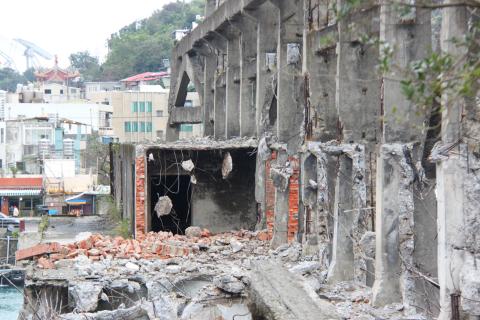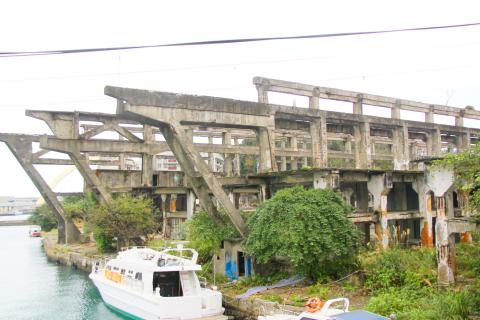A subcontractor that allegedly broke the law in the surprise partial demolition of the Agenna Shipyard in Keelung said that it planned to repurpose the area to enhance the city’s tourism beltway, with the demolition taking place to remove buildings that posed a threat to the public.
The shipyard was recently brought to public attention due to the 2014 filming of a trailer for Call of Duty Online, part of the first-person shooting game franchise Call of Duty, starring US actor Chris Evans, who is best known for his portrayal of the lead role in the Captain America movie franchise.
The subcontractor, which leased the land from Taiwan Sugar Co (Taisugar, 台糖) in 2008, allegedly violated Article 86 of the Building Act (建築法) when it moved two excavators to the site on Monday afternoon to remove the ruins.

Photo: Lin Hsin-han, Taipei Times
Article 86-3 stipulates that the unauthorized removal of buildings can result in a maximum fine of NT$10,000.
The subcontractor’s representative, Hsu Shu-ming (許書銘), said it had conducted inspections of the ruins and deemed them too old to be directly repurposed, adding that the demolition was aimed at making the area safer, especially following the magnitude 6.4 earthquake on Feb. 6.
The original plan was to keep the shipyard and open a theme restaurant nearby, but the ruins, while eligible for reinforcing, might have become rotten inside, which would have greatly increased overheads and posed a safety risk, Hsu said, adding that plans were later stalled when the city government was considering building a light-rail system nearby.

Photo: Lin Hsin-han, Taipei Times
Keelung Mayor Lin Yu-chang (林右昌) on Monday night on Facebook condemned the demolition and rejected the notion that the city government had knowledge of the subcontractor’s plans.
Anyone that shows so much disrespect for local buildings and their historical significance should be condemned, Lin said.
Lin said the city government would fine the subcontractor, as it did not apply for a permit to remove or demolish the building.
The city government has also demanded that the subcontractor cease all demolition work and apply for a permit, Lin said, adding that the city would do its utmost to preserve an “important remnant of Keelung’s early industry.”
Although the ruins are on private property, they are still an important part of the city’s history and should be conserved, Lin said, adding with regret that Monday’s abrupt demolition work might have marred the bright future repurposing could have given the shipyard.
However, the shipyard has not been named a historical heritage site and sits on land owned by Taisugar, which obtained it from now-defunct Taiwan Metals Mining Co (台金公司).
Meanwhile, Taisugar department of public relations director Liu Tsung-hsien (劉宗憲) said that the company had made clear to the subcontractor the parameters for development of the site.
There are no plans to develop the land around the shipyard’s ruins, Liu said, adding that Taisugar would release more information after clarifying details with the subcontractor.
The shipyard, next to Heping Bridge (和平橋), which connects Keelung and Heping Island (和平島), was originally owned and used by Japanese companies during the Japanese colonial era to expedite the transportation of gold from the Jinguashih (金瓜石) area in what is now New Taipei City. It derives its name from a US yacht manufacturing firm that had leased the property from Taiwan Metals Mining.

TRAGEDY STRIKES TAIPEI: The suspect died after falling off a building after he threw smoke grenades into Taipei Main Station and went on a killing spree in Zhongshan A 27-year-old suspect allegedly threw smoke grenades in Taipei Main Station and then proceeded to Zhongshan MRT Station in a random killing spree that resulted in the death of the suspect and two other civilians, and seven injured, including one in critical condition, as of press time last night. The suspect, identified as a man surnamed Chang Wen (張文), allegedly began the attack at Taipei Main Station, the Taipei Fire Department said, adding that it received a report at 5:24pm that smoke grenades had been thrown in the station. One man in his 50s was rushed to hospital after a cardiac arrest

SAFETY FIRST: Double the number of police were deployed at the Taipei Marathon, while other cities released plans to bolster public event safety Authorities across Taiwan have stepped up security measures ahead of Christmas and New Year events, following a knife and smoke bomb attack in Taipei on Friday that left four people dead and 11 injured. In a bid to prevent potential copycat incidents, police deployments have been expanded for large gatherings, transport hubs, and other crowded public spaces, according to official statements from police and city authorities. Taipei Mayor Chiang Wan-an (蔣萬安) said the city has “comprehensively raised security readiness” in crowded areas, increased police deployments with armed officers, and intensified patrols during weekends and nighttime hours. For large-scale events, security checkpoints and explosives

PUBLIC SAFETY: The premier said that security would be tightened in transport hubs, while President Lai commended the public for their bravery The government is to deploy more police, including rapid response units, in crowded public areas to ensure a swift response to any threats, President William Lai (賴清德) said yesterday after a knife attack killed three people and injured 11 in Taipei the previous day. Lai made the remarks following a briefing by the National Police Agency on the progress of the investigation, saying that the attack underscored the importance of cooperation in public security between the central and local governments. The attack unfolded in the early evening on Friday around Taipei Main Station’s M7 exit and later near the Taipei MRT’s Zhongshan

ON ALERT: Taiwan’s partners would issue warnings if China attempted to use Interpol to target Taiwanese, and the global body has mechanisms to prevent it, an official said China has stationed two to four people specializing in Taiwan affairs at its embassies in several democratic countries to monitor and harass Taiwanese, actions that the host nations would not tolerate, National Security Bureau (NSB) Director-General Tsai Ming-yen (蔡明彥) said yesterday. Tsai made the comments at a meeting of the legislature’s Foreign Affairs and National Defense Committee, which asked him and Minister of National Defense Wellington Koo (顧立雄) to report on potential conflicts in the Taiwan Strait and military preparedness. Democratic Progressive Party (DPP) Legislator Michelle Lin (林楚茵) expressed concern that Beijing has posted personnel from China’s Taiwan Affairs Office to its